4 minutes
Pension performance update: August 2023
- By
- Murray Humphrey
See how Penfold's funds and the global markets performed in August. Plus: Marks and Spencer bounces back.

After the party comes the hangover. As is usual with stocks and shares, long periods of growth are almost always punctuated by losses, and this was true in August when many months of consecutive gains came to an end as markets began to wobble and investors took their summer breaks.
This is why it is always important to remember that you have a very long time horizon with pension savings. They are invested to generate growth in your savings over the long term, but that growth is only possible by having short term ups and downs along the way.
This article is intended to help you understand some of the key reasons why those ups and downs happen. Keep in mind that markets have historically always recovered to grow steadily over the long term.
How our pension plans performed
The slump seen across all markets globally consequently dented the performance of our pension plans in August but they held up well with a couple managing to keep hold of the gains they made in July.
Our pension plans demonstrated their resilience during what is always typically a difficult month for stock markets across the world.
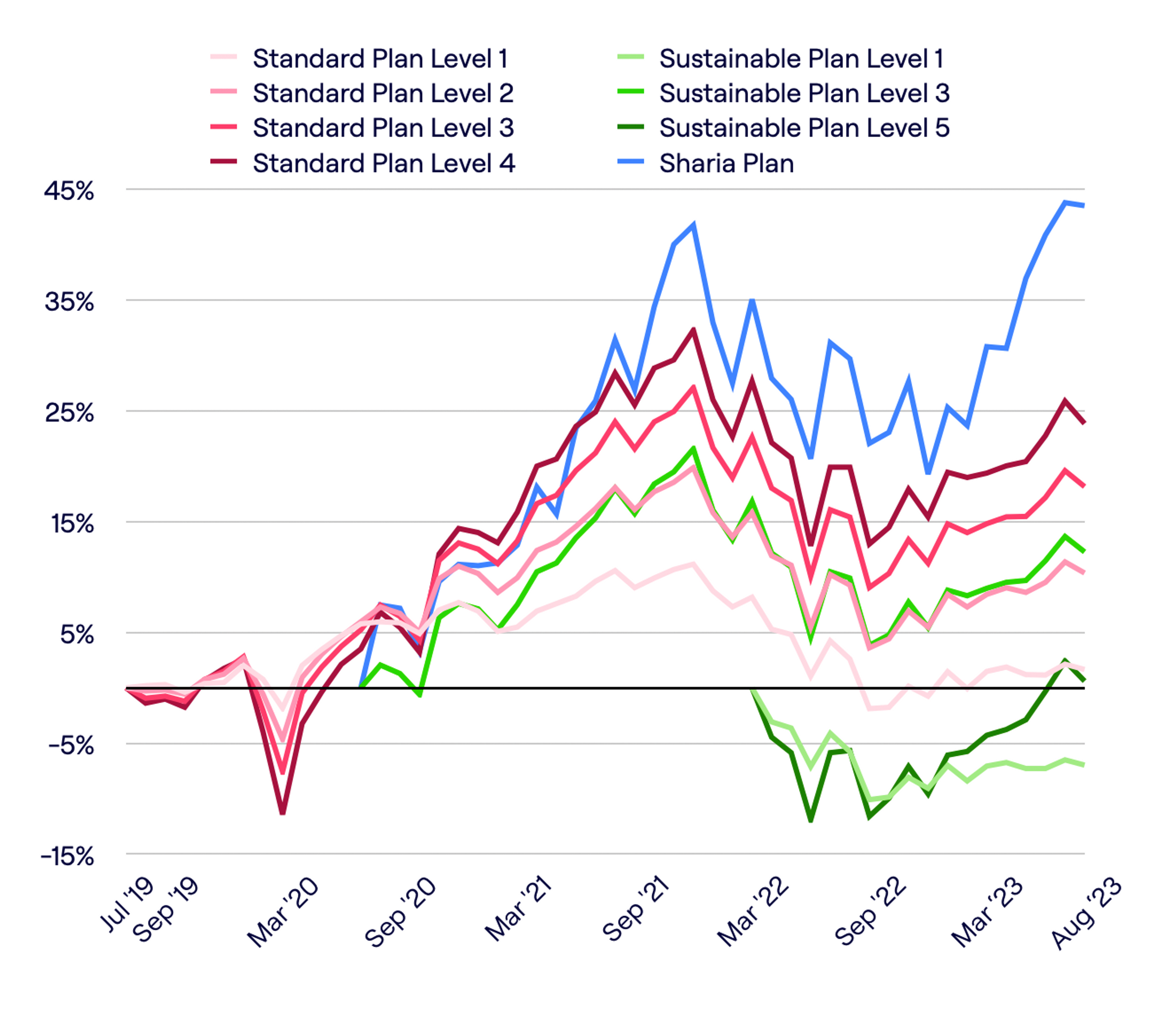
What makes this possible? There's no hidden secret. Penfold's funds are built on strategically diversified portfolios designed to decrease risk exposure, limit potential losses, and improve overall investment performance.
This approach is particularly valuable during challenging market conditions, as a well-diversified portfolio is more likely to withstand market fluctuations and deliver more stable returns over time.
US: After the rise comes the fall
After five months of straight gains for the US market, it was almost inevitable that a fall was around the corner. The summer month of August is always typically marked by stock market slumps as investors head off on their holidays, and this year was no different.
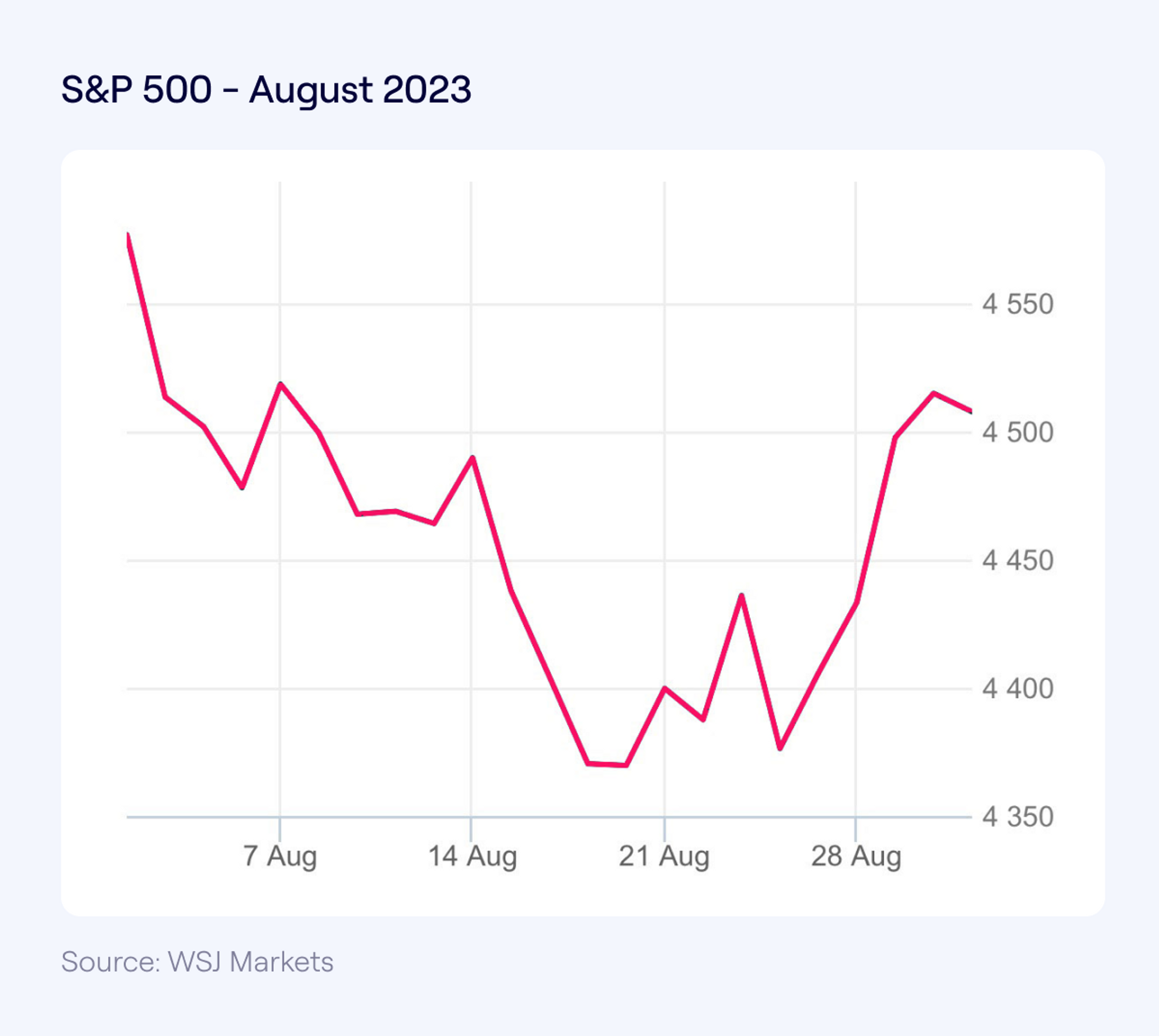
However, the month got off to a particularly bad start after Fitch, one of three major independent agencies that assess the creditworthiness of countries and companies, downgraded the US government's credit rating on the back of fears over the state of the country's finances.
Fitch and the other two rating agencies, Moody’s and Standard and Poor’s, have a stranglehold over the assessment of the financial health of companies and countries – and so when they talk, the market listens.
The downgrade spooked investors and caused the S&P 500, which tracks the performance of the biggest 500 companies in the US, to temporarily tumble. Added to the fears over the downgrade, there was also further evidence that it might take the US Federal Reserve longer to reach its 2% inflation target after data published in August showed consumer prices in the US had continued to climb.
Price rises compel central banks to act and to try and slow prices by increasing interest rates. But this sucks money out of the economy and is invariably bad for stock markets and pension funds. And so the hope is the next set of data will show prices falling.
But it wasn’t all bad news in August as the share price of one of the biggest success stories of this year, Californian chipmaker Nvidia, hit an all time high during the month after the technology company posted second quarter earnings that beat expectations.
Nvidia has been riding the wave of the surge in interest in artificial intelligence. The multinational company is one of the most dominant suppliers of AI hardware and software and its share price jumped more than 10% over the month on top of an already eye watering rise of 230% this year.
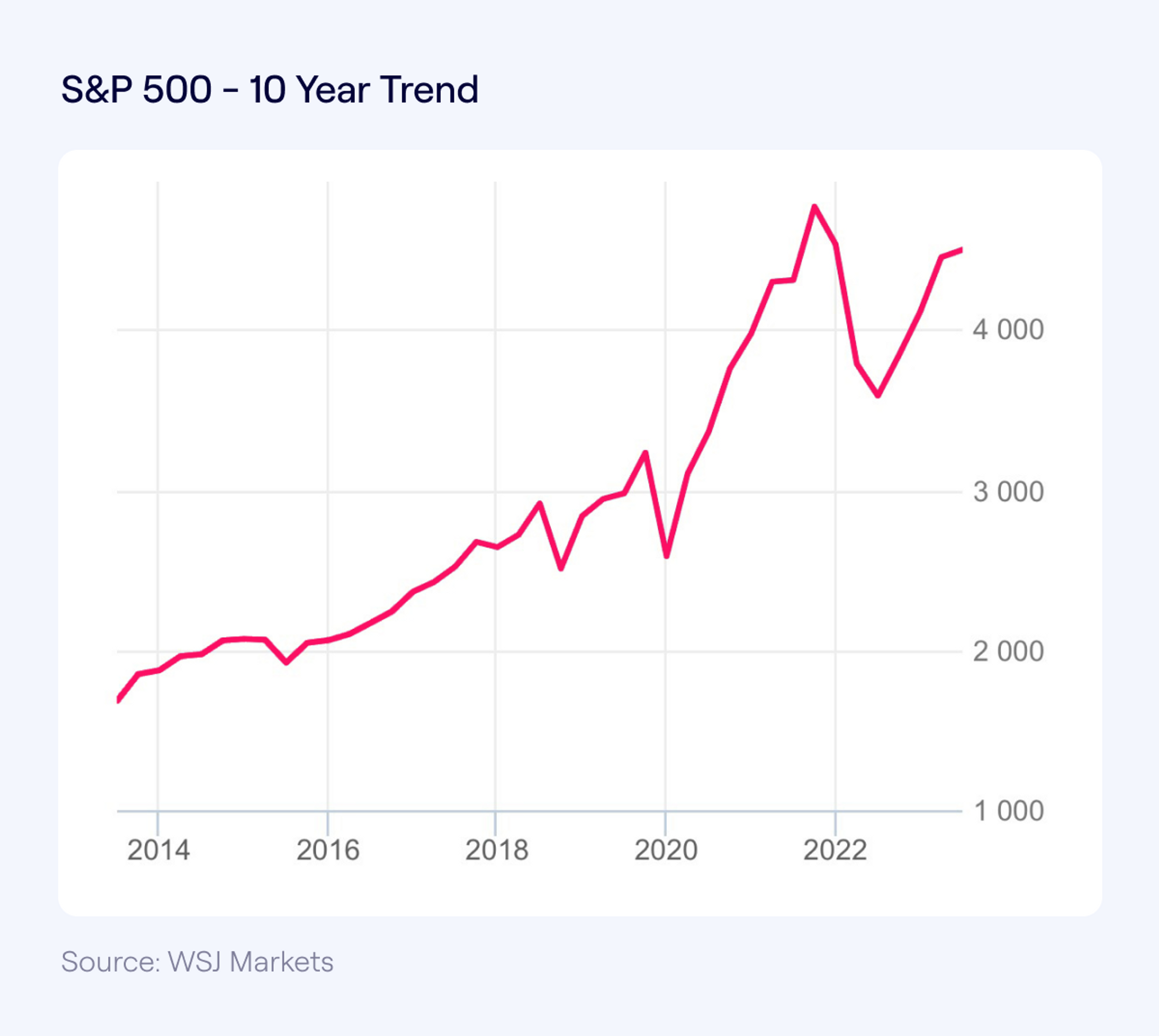
While it's helpful to stay informed with the latest news, the S&P 500's upward trend over the past decade demonstrates that, despite short-term market fluctuations influenced by financial events, it's the long-term growth trajectory that is crucial for accumulating pension wealth.
UK wages increase at record rate while M&S shines
The UK stock market was not left unscathed by the falls observed in the US, and the gains made in July by the FTSE 100, which tracks the performance of the biggest 100 companies in the UK, were reversed.
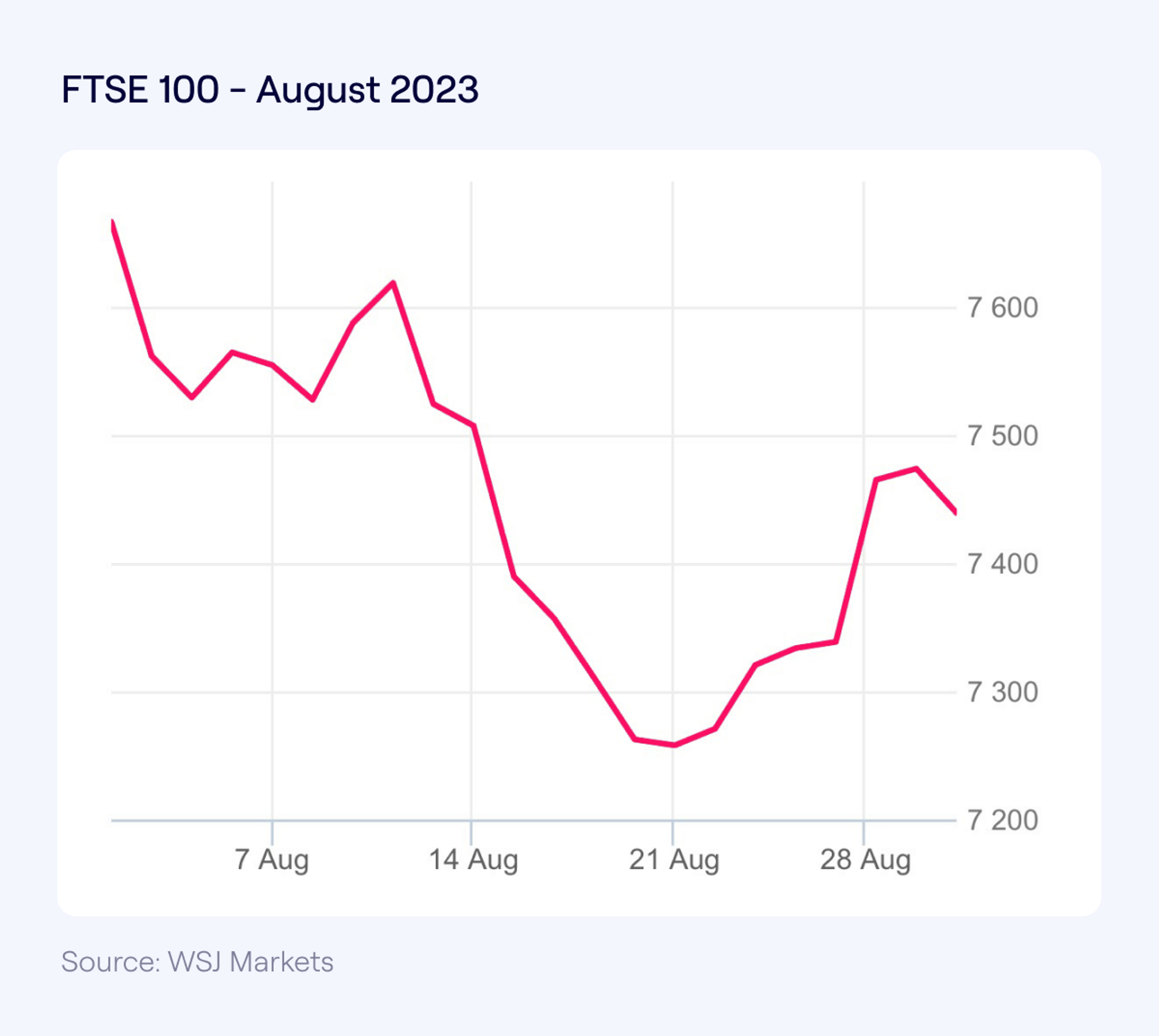
The concerns surrounding Fitch’s downgrade of the US government’s credit rating spread to the UK as the US is the world’s biggest economy and problems there are nearly always felt elsewhere. And this slide in confidence was compounded by the release of data that showed wages in Britain were growing at a record rate.
Mirroring the US, this sparked fears that it would mean the UK government would now struggle to meet its 2% inflation target and that more interest rate rises would be needed, despite the Bank of England already enacting a gruelling 14 back-to-back increases.
There were some rays of hope, however. Marks & Spencer, the darling of the UK high street, revealed that its interim financial results, scheduled to be published in November, would show "a significant improvement" in its performance on the back of a revamp of its shops and clothing range.
Such has been the turnaround at the retailer that it returned to the FTSE 100 index of Britain's biggest listed companies for the first time in four years at the end of August as a result of its rapidly increasing share price. The value of the company has outstripped that of others after a share price spike of more than 75% so far this year.
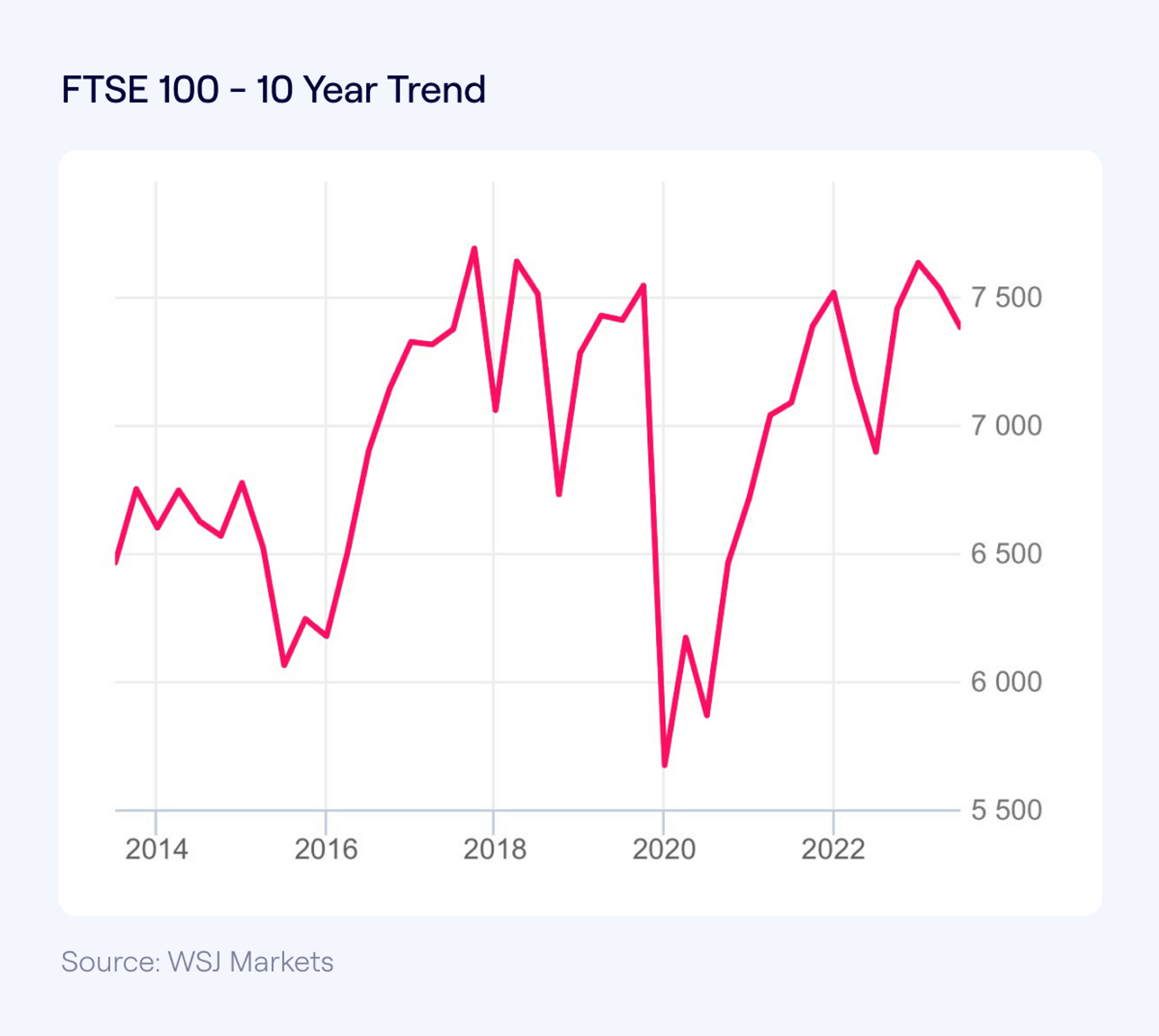
As the 10 year performance graph of the FTSE 100 above shows, it's the long-term trajectory that truly matters when it comes to building your pension pot. Short-term market changes may occur, but it's the consistent growth over time that contributes significantly to your pension.
EU dented by problems in China
Two consecutive months of gains for European stocks also came to an end in August. The continent was not immune to the problems observed in the US and the threat of rising inflation seen elsewhere.
Consumer prices for the 20 countries that use the euro increased 5.3% on average in August, well above the 2% target set by the European Central Bank, which could force the ECB to increase interest rates yet again when it meets in September. The benchmark rate is already at 3.75% and any further rise would set a record high.
The Eurozone, like all the major economies, is also impacted by the performance of China, the world’s second largest economy. After three years of strict ‘zero Covid’ lockdowns the expectation was that the Chinese economy would now burst into action and help propel the stock markets of other major economies globally, but that has not come to pass.
China’s youth unemployment has grown, retail sales have slowed and industrial output has spluttered and this has all dented the confidence of investors across the world, including those in Europe. They will be wishing for much better news in September.
Our greatest hits
If you're reading this as an accountant already an established partner of Penfold, or an intermediary facilitating pensions or payroll for your clients, we’ve brought together some of our ‘greatest hits’.
If you like our proposition and are looking for information about us to forward onto your clients, we’ve collected it all together on our partner resources page. You will find guides for those new to Penfold, videos that showcase our difference in under a minute, and case studies featuring the businesses we work with. Take a look.

Murray Humphrey
Penfold